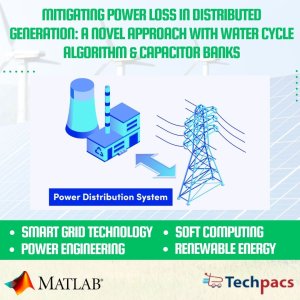Optimizing Distributed Generation Placement and Sizing using Genetic Algorithm, Particle Swarm Optimization, and PSO-Sim.
Problem Definition
The existing literature has highlighted several shortcomings in the current approaches used for determining the optimal size and location of Distributed Generators (DGs) within distribution systems. While Evolutionary and meta-heuristic optimization algorithms like ABC, CSOS, WHO, and ICA have been employed in the past, these methods fall short in addressing all technical, environmental, and economic issues. The lack of a comprehensive approach hinders the flexibility of distribution systems and ultimately results in suboptimal outcomes, failing to sufficiently enhance voltage stability and minimize power losses.
The identified limitations underscore the critical need for a new approach that can effectively allocate DG units to maximize voltage stability and minimize power losses. This new approach must address the shortcomings of existing methods and provide a more holistic solution that considers all aspects of distribution system operation.
By developing a more efficient and effective strategy for the optimal allocation of DG units, it is possible to achieve significant improvements in voltage stability and power loss reduction within distribution systems.
Objective
The objective is to develop a hybrid method using Particle Swarm Optimization (PSO) and Genetic Algorithm (GA) to determine the optimal size and location of Distributed Generation (DG) units in distribution systems. This approach aims to enhance voltage stability, minimize power losses, and address the limitations of existing methods by offering robustness, support for multi-objective optimization, and easier implementation. By sequentially using GA and PSO algorithms, as well as utilizing the simultaneous placement approach of PSO-Sim, the goal is to improve the overall operation of distribution systems through efficient DG allocation.
Proposed Work
In the proposed work, the focus is on addressing the research gap related to determining the optimal size and location of Distributed Generation (DG) units to enhance the voltage stability and minimize power losses in distribution systems. The existing literature shows that current approaches utilizing Evolutionary and meta-heuristic optimization algorithms have limitations in addressing technical, environmental, and economic issues while providing flexible operation of the distribution system. To overcome these limitations, a hybrid method incorporating Particle Swarm Optimization (PSO) and Genetic Algorithm (GA) is proposed for identifying optimal DG placement locations. The use of PSO, GA, and PSO-Sim algorithms offers advantages such as robustness in handling complex optimization problems, support for multi-objective optimization, and easier implementation with less complexity.
The proposed approach involves the sequential use of GA and PSO algorithms, as well as the simultaneous placement offered by the PSO-Sim approach.
GA eliminates the need for derivative calculations, supports multi-objective optimization, and is robust against local minima/maxima. PSO provides a simpler implementation and the PSO-Sim approach allows for simultaneous placement of DG units. By utilizing these three approaches, the goal is to improve voltage stability and minimize power losses through optimal placement of DG units. The effectiveness of each approach will be evaluated based on their impact on voltage stability and power losses in distribution systems.
Application Area for Industry
This project can be widely applied across various industrial sectors such as manufacturing, energy, transportation, and infrastructure development. In the manufacturing sector, the optimal placement of DG units can enhance energy efficiency and reduce operational costs. For the energy sector, this project can help in improving the reliability and stability of the grid by minimizing power losses and voltage fluctuations. In the transportation sector, implementing these solutions can lead to more efficient electric vehicle charging infrastructure. In the infrastructure development domain, the project can contribute to sustainable urban development by integrating renewable energy sources effectively.
Specific challenges that industries face, such as increasing energy costs, grid instability, and environmental concerns, can be addressed through the proposed solutions of GA, PSO, and PSO-Sim algorithms. By optimizing the placement and size of DGs, industries can experience improved voltage stability, reduced power losses, and overall enhancement in system performance. The benefits of implementing these solutions include cost savings, increased energy efficiency, reduced carbon footprint, and better overall system reliability. Ultimately, the project's proposed solutions can bring about significant improvements in various industrial domains by addressing critical issues and optimizing the operation of distribution systems.
Application Area for Academics
The proposed project can significantly enrich academic research, education, and training in the field of optimization algorithms for optimal placement of Distributed Generators (DGs) in distribution systems. By comparing the efficiency and effectiveness of Genetic Algorithm (GA), Particle Swarm Optimization (PSO), and PSO-Sim approach, researchers, MTech students, and PHD scholars can gain valuable insights into the application of these algorithms in solving complex optimization problems in power systems.
The relevance of this project lies in its potential to address the technical, environmental, and economic issues associated with distribution systems by enhancing voltage stability and minimizing power losses through optimal allocation of DG units. By utilizing GA and PSO algorithms, researchers can explore novel methods for improving system performance, while the PSO-Sim approach offers a unique simultaneous placement strategy that may yield more efficient results.
The project opens up opportunities for innovative research methods, simulations, and data analysis within educational settings, allowing students and scholars to delve into the intricacies of optimization algorithms and their applications in power system optimization.
By studying the code and literature of this project, researchers can enhance their understanding of optimization techniques and potentially apply these methods to their own work in related fields.
Moving forward, the project may serve as a valuable resource for further research and development in optimizing distribution systems, providing a foundation for exploring new algorithms, techniques, and applications in the realm of power systems optimization. As technology continues to evolve, the scope for utilizing advanced optimization algorithms in academic research and training will only grow, making this project a significant contribution to the field.
Algorithms Used
In the project, Genetic Algorithm (GA), Particle Swarm Optimization (PSO), and PSO-Sim (Particle Swarm Optimization-Simultaneous) algorithms are proposed to optimally place and size Distributed Generators (DGs) in order to improve Voltage Stability Index (VSI) and minimize power losses. GA is chosen for its ability to solve complex and discontinuous optimization problems without the need for derivatives of the objective function, support for multi-objective optimization, and robustness against local minima/maxima. PSO is preferred for its ease of implementation and lower complexity compared to other optimization algorithms. PSO-Sim allows for the simultaneous placement of DGs, which can potentially lead to more efficient solutions. By utilizing these algorithms, the project aims to enhance accuracy in determining the optimal placement of DGs, improve overall system efficiency, and achieve the objectives of enhancing voltage stability and minimizing power losses.
Keywords
SEO-optimized keywords: Evolutionary algorithms, meta-heuristic optimization, ABC algorithm, CSOS algorithm, WHO algorithm, ICA algorithm, optimal operation, technical issues, environmental issues, economic issues, distribution systems, flexible operation, voltage stability, power losses, optimal allocation, DG units, optimal results, voltage stability, power losses, optimal placement, GA algorithm, PSO algorithm, PSO-Sim algorithm, objective function, multi-objective optimization, local minima, local maxima, complexity, optimal placement, VSI improvement, power loss reduction, Particle Swarm Optimization, Genetic Algorithm, Distributed Generation, Load Flow Analysis, Radial Distribution System, Heuristic Algorithms, Clean Energy, Renewable Energy, Power Distribution Systems, Power System Optimization, Power Generation Planning, Power System Analysis, Power System Efficiency, Distributed Energy Resources, DG Integration, Power System Planning, Population Growth, Electricity Demand, Power System Performance, Power System Economics.
SEO Tags
Particle Swarm Optimization, Genetic Algorithm, Distributed Generation, Optimal DG Placement, Load Flow Analysis, Radial Distribution System, Heuristic Algorithms, Power Loss Reduction, Clean Energy, Electricity Demand, Renewable Energy, Power Distribution Systems, Power System Optimization, Power Generation Planning, Power System Analysis, Power System Efficiency, Distributed Energy Resources, DG Integration, Power System Planning, Population Growth and Electricity Demand, Power System Performance, Power System Economics, PSO, GA, PSO-Sim, Evolutionary Algorithms, Meta-heuristic Optimization Algorithms, ABC, CSOS, WHO, ICA, Voltage Stability, Power Loss Minimization, Optimal Allocation of DG Units, Voltage Stability Improvement, Technical Issues in Distribution Systems, Environmental Issues in Distribution Systems, Economic Issues in Distribution Systems, Flexible Operation of Distribution System, Optimal Results, Voltage Stability Enhancement, Power Loss Minimization, PHD, MTech, Research Scholar, Research Topic, Optimization Algorithms, Renewable Energy Integration.
| Shipping Cost |
|
No reviews found!

















































No comments found for this product. Be the first to comment!